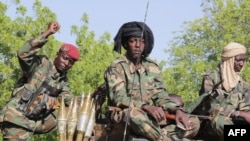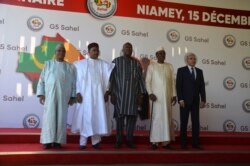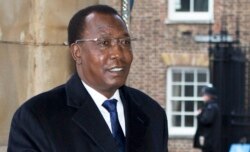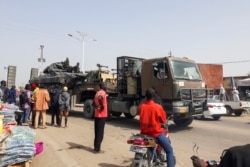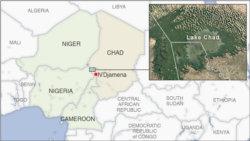France and other countries in Africa’s Sahel region have called on Chad to send additional troops “as soon as possible” to an area wracked by instability and violent extremism.
The request came last week during a videoconference between representatives of France and five countries from the Sahel region that are involved in a military alliance that has been battling a growing Islamist insurgency.
The Sahel is a semi-arid region that stretches from Sudan in the east to the Atlantic Ocean in the west. It includes Niger, Mali, Chad, Burkina Faso and Mauritania. These nations are known as the G5 Sahel countries.
The countries “highlighted the importance of sending a Chadian battalion to the Three-Borders area as soon as possible,” according to a joint statement following the G5 Sahel-France meeting last week.
The tri-border area, where Mali, Niger and Burkina Faso converge, has had a surge in violent attacks carried out by Islamist militants, some of which are affiliated with al-Qaida and Islamic State terror groups.
Important role
Chad’s military plays a significant role in the 5,000-strong G5 force, which cooperates with French troops who have been present in the region since the outbreak of an insurgency in Mali in 2012.
But in early April, Chadian President Idriss Deby made a surprise announcement, saying that “no Chadian soldier will take part in an external military operation.” The announcement came after a Boko Haram militant attack that killed 98 Chadian troops.
But Chad’s foreign ministry said Deby’s remarks had been misinterpreted and only meant the Chadian army would no longer conduct unilateral operations beyond its borders in the Lake Chad basin.
French officials also have asserted that Chad remains committed to their joint counterterrorism efforts in the Sahel.
Experts said France cannot afford losing Chad as a major military partner for its counterterrorism activities in the restive region.
“The Chadian forces have been some of the most effective on the ground,” said Daniel Eizenga, a Research Fellow at the Africa Center for Strategic Studies in Washington.
“They tend to have a significant amount of experience, combat experience and operational experience,” he told VOA.
Bakary Sambe, a security expert at the Timbuktu Institute in Dakar, Senegal, says France needs Chad now more than ever as the European power grapples to contain the spread of the coronavirus.
“Chad remains the fallback solution for both the G5 Sahel and France,” he told VOA, adding that Sahel’s “national armies are struggling to rid the tri-border area of jihadists.”
Sambe said that “despite the COVID crisis, the region continues to [witness] instability and intercommunity massacres, especially in Burkina Faso.”
Shifting focus
Following the late March attack by Boko Haram that killed 98 Chadian soldiers, some experts say Chad could be more inclined to focus its resources on other fronts, notably in the Lake Chad basin, where Islamist groups are increasingly active.
Analyst Eizenga believes the presence of Boko Haram militants in Chad and on Chad’s borders represents a more pressing concern for the country, while the conflict going on in the tri-border of Sahel, remains “fairly far removed” from Chad.
“Conflict in that particular region of Sahel doesn’t necessarily pose an immediate threat to security and stability in Chad, whereas activities around Lake Chad from Boko Haram and Islamic State West Africa [affiliates] pose a more immediate threat,” he said.
Eizenga, however, noted that “the Chadian government will likely end up supporting the G5 Sahel, because it is in their long-term interest to do so.”
Civilians caught up in violence
The conflict in the Sahel and Lake Chad regions has killed thousands of people in recent years. The U.N. says the violence in both regions this year so far has forced 50,000 people to flee their homes and villages.
“Too many civilians in the Sahel and Lake Chad Basin have already paid a high price and should not be made to suffer more,” Aissatou Ndiaye, deputy director for the United Nations refugee agency’s Bureau for West and Central Africa, said in a statement in April.
“Attacks and counter-attacks are constantly pushing populations living in the border areas into deeper misery and risk annihilating any advances in building their resilience,” he added.
U.N. officials say armed conflicts and violence in Sahel and Lake Chad in recent years have internally displaced some 3.8 million, while 270,000 have fled to neighboring countries as refugees.
U.S. engagement
The United States has between 6,000 and 7,000 troops in Africa, mainly in West Africa, and is considering a reduction.
The possible reduction is reportedly part of a worldwide review by the Department of Defense, which is looking for ways to tighten its focus on China and Russia. These plans have alarmed African governments that rely on U.S. support for combating extremism.
U.S. officials, however, say Washington continues to remain engaged with its African partners in the war on terrorism.
“The U.S. military’s commitment to our partners is vast – taking many forms,” said Peter Marocco, the deputy assistant secretary of defense for African Affairs.
“We plan to maintain engagement across a wide spectrum of activities to address terrorist threats on the continent,” Marocco said in an interview published Friday on the U.S. Department of Defense’s website.
Bagassi Koura of VOA’s French Service contributed to this report from Washington. Some information in this story came from Reuters.




